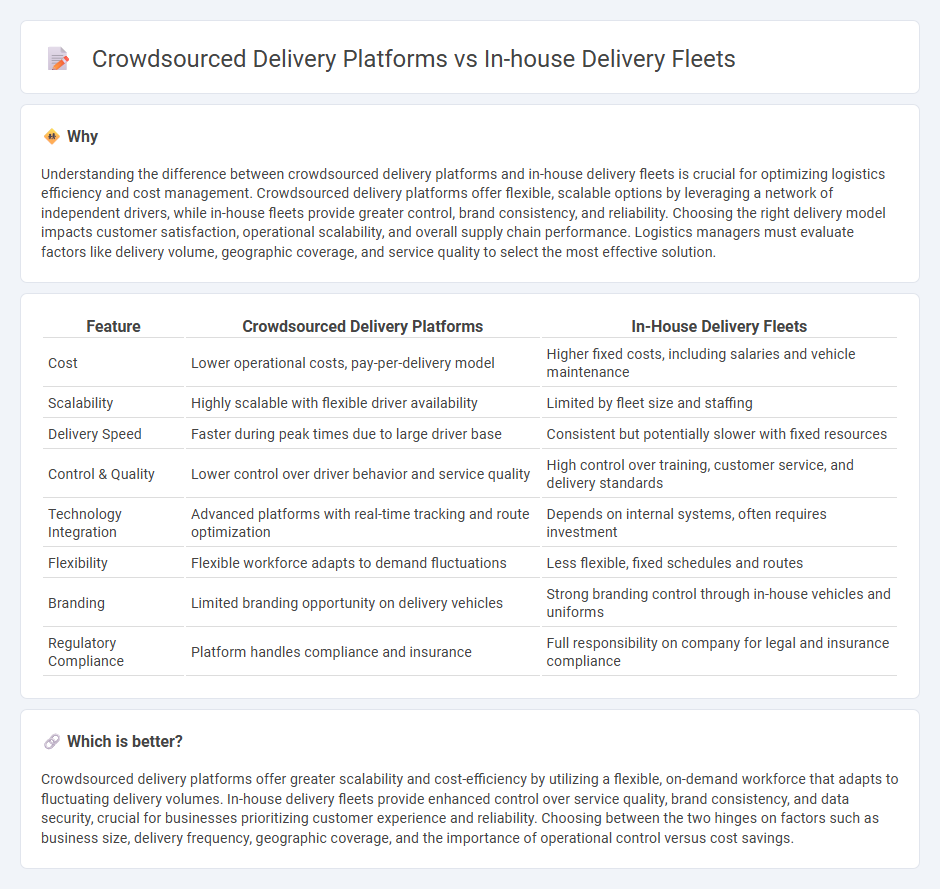
Crowdsourced delivery platforms leverage independent contractors to provide flexible, on-demand logistics solutions, reducing operational costs and scaling capacity rapidly. In-house delivery fleets offer greater control over customer experience, brand consistency, and route optimization but require significant investment in assets and workforce management. Explore the benefits and challenges of each model to determine the best fit for your supply chain strategy.
Why it is important
Understanding the difference between crowdsourced delivery platforms and in-house delivery fleets is crucial for optimizing logistics efficiency and cost management. Crowdsourced delivery platforms offer flexible, scalable options by leveraging a network of independent drivers, while in-house fleets provide greater control, brand consistency, and reliability. Choosing the right delivery model impacts customer satisfaction, operational scalability, and overall supply chain performance. Logistics managers must evaluate factors like delivery volume, geographic coverage, and service quality to select the most effective solution.
Comparison Table
| Feature | Crowdsourced Delivery Platforms | In-House Delivery Fleets |
|---|---|---|
| Cost | Lower operational costs, pay-per-delivery model | Higher fixed costs, including salaries and vehicle maintenance |
| Scalability | Highly scalable with flexible driver availability | Limited by fleet size and staffing |
| Delivery Speed | Faster during peak times due to large driver base | Consistent but potentially slower with fixed resources |
| Control & Quality | Lower control over driver behavior and service quality | High control over training, customer service, and delivery standards |
| Technology Integration | Advanced platforms with real-time tracking and route optimization | Depends on internal systems, often requires investment |
| Flexibility | Flexible workforce adapts to demand fluctuations | Less flexible, fixed schedules and routes |
| Branding | Limited branding opportunity on delivery vehicles | Strong branding control through in-house vehicles and uniforms |
| Regulatory Compliance | Platform handles compliance and insurance | Full responsibility on company for legal and insurance compliance |
Which is better?
Crowdsourced delivery platforms offer greater scalability and cost-efficiency by utilizing a flexible, on-demand workforce that adapts to fluctuating delivery volumes. In-house delivery fleets provide enhanced control over service quality, brand consistency, and data security, crucial for businesses prioritizing customer experience and reliability. Choosing between the two hinges on factors such as business size, delivery frequency, geographic coverage, and the importance of operational control versus cost savings.
Connection
Crowdsourced delivery platforms and in-house delivery fleets are interconnected through hybrid logistics models that optimize last-mile delivery efficiency and scalability. Companies leverage crowdsourced drivers for flexible, on-demand capacity while maintaining control and reliability with their own delivery fleet. Integration of data analytics and real-time tracking systems enhances coordination, reduces delivery times, and improves overall customer satisfaction.
Key Terms
Fleet Ownership
In-house delivery fleets offer complete control over fleet ownership, allowing businesses to manage vehicle maintenance, driver training, and branding directly, which enhances operational consistency and customer experience. Conversely, crowdsourced delivery platforms rely on independent contractors using their own vehicles, reducing overhead costs but potentially sacrificing reliability and quality control. Explore the advantages and challenges of fleet ownership in delivery strategies to optimize your logistics operations.
Cost Structure
In-house delivery fleets incur fixed costs such as vehicle maintenance, driver salaries, and fuel, leading to higher upfront investments but predictable expenses. Crowdsourced delivery platforms minimize fixed costs by leveraging independent contractors, resulting in variable costs tied to order volume and often lower operational expenses. Explore detailed cost comparisons to determine the optimal delivery model for your business.
Flexibility
In-house delivery fleets offer controlled scheduling and consistent service levels, ensuring brand reliability and operational efficiency. Crowdsourced delivery platforms provide unparalleled flexibility by leveraging a vast network of independent drivers available on-demand, adapting quickly to fluctuating order volumes. Explore further to understand which delivery model best meets your business's dynamic needs.
Source and External Links
Internal vs. External Delivery Fleets: Which Should You Use in 2024 - In-house delivery fleets are operated independently with dedicated staff and vehicles, allowing greater flexibility and control over deliveries, such as handling sensitive items and enabling immediate re-routing to improve customer value and service consistency.
Why Retailers are Investing in In-House Delivery Fleets | Bringoz - Retailers invest in in-house delivery fleets to gain full control of the delivery process, improve branding through custom vehicles and uniforms, and achieve cost savings and operational efficiency using advanced route optimization and delivery management tools.
Outsourced vs In-House Delivery Drivers: What's the Difference? - In-house delivery fleets provide full operational control and consistent branding, enable direct driver training aligned with company values, and can become cost-efficient for high-volume businesses despite requiring high initial investment and management effort.
 dowidth.com
dowidth.com